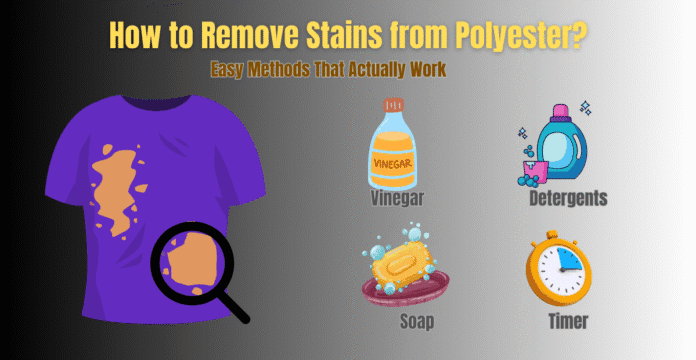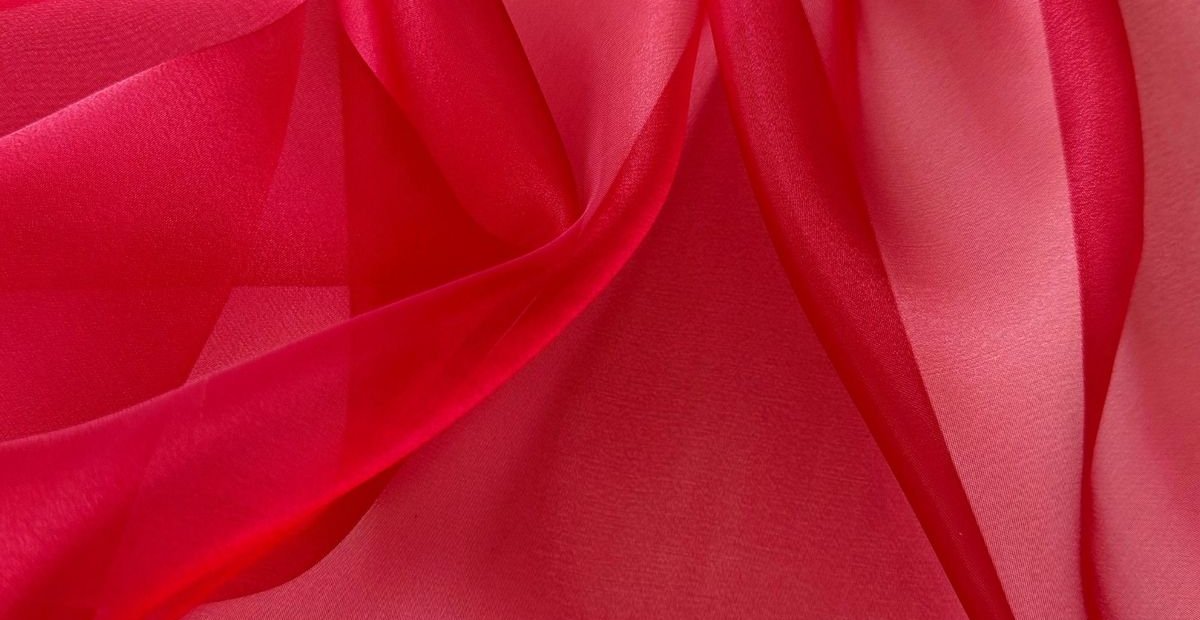Introduction: Why Polyester Stains Differently
Polyester is a common synthetic fabric as it is a durable, wrinkle-resistant, and relatively cheap fabric. It does not absorb water easily and is thus, fast to dry unlike natural fibers. But its positivity is also due to the fact that it is synthetic in nature thus exhibits high affinity with oil-based stains. That is why polyester is often more difficult to clean than cotton because of the grease, makeup, or even sweat. So there is always a question “How to remove stains from polyester?”
Polyester stains should be treated in a certain way because the inappropriate technique can make them permanent. As an example, hot water has the ability of locking protein-based stains such as blood into the fibers. Just as over-scrubbing can destroy the soft polyester weave. How to Remove Stains from Polyester?
It is not only that knowing how to remove stains on polyester is a way of saving your clothing but also increasing the duration of its life. With the proper techniques, you will be able to make your polyester clothes appear clean and fresh over a long period of time. How to Remove Stains from Polyester?
Types of Stains on Polyester
It is important to know the type of stains that are common to you in order to determine which removal method to use. The most common ones are as follows:
- Oil & Grease Stains
- Oils have a strong affinity with polyester fibers and therefore greasy stains resist easily.
- Food & Drink Stains
- Polyester can be discolored by coffee, wine, juice or sauces as they leave visible marks.
- Ink Stains
- The deep and pigmented stains of ballpoint pens and markers are usually deep.
- Sweat & Deodorant Stains
- Due to body salts and deodorant, yellowing and accumulation takes place under arms.
- Blood Stains
- Stains made of proteins, which are treated in cold water.
- Makeup & Cosmetic Stains
- Lipsticks, foundations, and mascara have oils and colors, which stick to polyester.
General Stain Removal Tips for Polyester
Read Care Label: It is always advisable to begin with reading the care tag of the garment. The label indicates the safe water temperature and cleaners. To follow the advice of Real Homes, it is always important to refer to the care label first when it comes to treating a stain. How to Remove Stains from Polyester?
Act Quickly: Treat fresh stains as quickly as possible. According to Sympli, the bigger the stain the sooner it goes away, the more easily. Fast response will avoid the setting in of stains onto the fibers.
Do Not use Hot Water on Protein Stains: Blood, sweat or egg stains should be run in cold water. The proteins cure and attach to fibers in the presence of heat. Persil cautions that proteins are designed to adhere to each other when warm hence rinse blood stains in cold water. Experts in laundry also note that hot water will cook the stains into the fabric. How to Remove Stains from Polyester?
Do Not Rub Aggressively: Blot, but do not scrub hard. Aggressive rubbing may dull into more permanent the stain or it may destroy the fine fibers of polyester. Actually, Sympli warns particularly: “Do not rub, it can cause the stain to go further into the fabric. How to Remove Stains from Polyester?
Test First: It is always important to spot-test any cleaner in an inconspicuous place. A little test is used to make sure that the stain remover does not discolor or weaken the polyester. This is particularly relevant to bright dyes or delicate blends. How to Remove Stains from Polyester?
Step-by-Step Methods for Removing Stains
Each stain type needs a unique method. Below are effective hacks that truly work:
Oil and Grease Stain: Dish Soap + Baking Soda.
- Wipe off all the remaining oil using a paper towel.
- Pour baking soda onto the grease.
- Allow to rest 15 minutes, and brush off.
- Put some dish soap and rub it into the cloth.
- Wash with warm water and normal wash.
Food Stains: Vinegar, Hydrogen Peroxide or Enzyme Detergents
- Combine vinegar and water in equal measure, blot the stain.
- In more stubborn stains, use hydrogen peroxide, but test on hidden cloth.
- Sauce or wine are organic and enzymes based detergents work best on them.
- Wash the cloth as soon as it is treated.
Ink Stains: Rubbing Alcohol or Hand Sanitizer
- Put a paper towel that is wet under the stain.
- Dabbing alcohol or hand sanitizer on the ink.
- Blot dry using a clean cloth, change towels when ink is transferred.
- Wash thoroughly and then rinse.
Sweat and Deodorant stains: Vinegar + Mild Detergent Soak
- Combine vinegar with an equal portion of water.
- Wet the stained polyester by soaking it in 30 minutes.
- Wash and clean using weak detergent.
- Repeat in case of persistence of yellowing.
Blood Stains: Cold Water + Baking Soda Paste/Salt
- Wipe fresh blood stains with cold running water.
- In case of dry stains, use a mixture of baking soda and cold water.
- Allow 30 minutes then scrub lightly.
- Rinse and add cold water detergent.
Makeup Stains: Makeup Remover Wipe or Rubbing Alcohol
- Pat around excess makeup with paper towel.
- Apply makeup remover wipes on the affected area.
- On difficult stains, rubbing alcohol can be used and dabbed.
- Wash as usual when the stain has gone.
DIY & Natural Cleaning Solutions
Vinegar
White vinegar is a weak acid that is capable of dissolving most of the stains. It is non-toxic on a variety of colors and fabrics. In the case of polyester, the mineral based stains are dissolved in vinegar and the grease is cut. As an example, Active Laundry suggests the pre-soak of 1 hour of vinegar in water. How to Remove Stains from Polyester Vinegar assists in the raising of general stains without chemicals. it will not bleach polyester, in fact it can even darken in the right amount. How to Remove Stains from Polyester?
Baking Soda
This is a household powder which takes smells and stains. It is a bit alkaline which contributes to raising dirt and physically pulls grease out of clothes. When an oily place is sprinkled with baking soda, it allows it to absorb oil and then brushed off. It is also possible to create a paste of baking soda (with water) to rub a stain out. It is extremely mild on polyester and can be applied on all colors. One of the disadvantages is that very stubborn stains might not be removed easily or after a single application. How to Remove Stains from Polyester?
Lemon Juice
Citric acid is a natural bleaching agent that is found in lemon juice. It is able to reduce most organic stains such as juice, sweat and rust. As observed by HowStuffWorks, citric acid in lemons also helps to dissolve stains and it is even safe with the color in the laundry. Lemon juice can be squeezed onto a stain or may be added up to 1 cup of juice into the wash to make whites bright. Lemon is however not as tough as bleach hence is effective on light or new stains. In addition, it is acidic and therefore should not be left unto hours on any fabric (a quick soak is okay).
Cornstarch
Cornstarch is an absorbent (a natural absorbent) of greasy stains, like baking soda or baby powder. You may sprinkle it plentifully on new spots of grease or oil, the starch will absorb the liquid. Shake off the powder after 1015 minutes. The Spruce states that starches such as baking soda and baby powder may absorb oil in case of being left on the stain. Cornstarch contains no chemicals and will not damage polyester, but it can only be used on fresh and liquid stains – it is unable to take away color or dry-set stains in isolation. How to Remove Stains from Polyester?
Pros & Cons: Natural vs. Chemical Cleaners
Safe cleaning agents include natural ones such as vinegar, baking soda, lemon and cornstarch, which are cheap and environmentally friendly. They do not lighten colors or scald the skin, and can be blended at the convenience of the house. They are however usually milder and might take longer or even more treatments on stubborn stains. Conversely, commercial stain removers and detergents usually include stiff enzymes or bleaching agents therefore, they are in a position to eliminate set-in stains faster. The negative side is that these products have rough chemicals and can destroy cloths as they are used several times. How to Remove Stains from Polyester?
Commercial Stain Removers for Polyester
OxiClean MaxForce
General-purpose stain and is safe on a majority of polyester fabric.
Shout Advanced Gel
Removes food stains and grease.
Carbona Stain Devils
Dedicated ink, grease or coffee stain formulas.
Pros of Commercial Cleaners:
Quick response and effective outcomes.
Special recipes of individual stains.
Convenient and easy to use.
Cons of Commercial Cleaners:
More costly than home craft.
Others can be composed of strong chemicals.
The danger of color fading in case of improper use.
Common Mistakes to Avoid
- Washing with Bleach on Colored Polyester: Bleach of bright polyester: Bleach should never be used on bright polyester. The synthetic fibers may be broken by bleach or permanently discoloured. Do not bleach polyester, as this is a synthetic cloth, bleaching may be permanent!. (Apply a bleach only to safe objects using an oxygen based bleach).
- Using Hot Water on the Stains which are not Protein: Do not pour hot water on the stains based on proteins (blood, sweat, milk). These stains will be fixed in hot water and they would be almost impossible to remove. Such stains should always be washed in cold water and then regular laundry should be done. (Greasy stains should be cleaned with hot water, however, and care labels should be observed).
- Over-Scrubbing: Intensive scrubbing or hard brushes may bend the polyester fiber and may result in snags or pilling. Apply light movements to rub out a stain. Too much pressure may destroy the surface of fabrics, thus be patient and blot or rub, gently. How to Remove Stains from Polyester?
How to Wash Polyester After Stain Removal
Washing Machine Settings
Wash it based on the care label. Polyester is usually washed in a standard cycle using hot water. In case the label enables, warm or hot washing is recommended to aid in the dissolution of any residue. It is recommended washing polyester in a machine using warm water and a normal laundry detergent. Wash with additional rinse in case you applied some form of heavy stain treatment so that all the product is washed off. Turn clothes inside to avoid damaging the outer part. How to Remove Stains from Polyester?
Drying Tips
Polyester dries fast yet in case of high heat it shrinks or pills. Wash in a tumble-dry on low, or dry by air. Based on care instructions, it should be tumbled at low temperature and should not be over-dried because a lot of heat will make the synthetic fibers shrink. Wrinkles and statics are also avoided by removing clothes immediately after dressing them in the dryer. How to Remove Stains from Polyester?
Re-check Stain Before Drying
Never leave the garment uninspected after washing it and before drying. In case any residue of the stain is left, then do not put the polyester in the dryer yet, as heat will fix the stain forever. Always be careful never to heat-set an oily (or any) stain in the dryer. Rewash instead Repeat steps of pretreatment as necessary. The garment should only be dried when the stain has completely faded. How to Remove Stains from Polyester?
Preventing Stains on Polyester
- Apply Fabric Protectant: Spray fabrics with a polyester protectant (such as Scotchgard) on new or fresh clean cloth. These sprays form a barrier which repels water and oils making the spills first form into beads making it easy to wipe them away.
- Quick Spot-Cleaning: Clean up spills on the spot, blot on a clean cloth or paper towel. The sooner you can get a stain off the less time it has to harden. Have a stain-remover pen or spray that can be used on the spot, before laundry.
- Good Laundry Practices: Wash polyester clothes after high usage (or after sweating) to avoid the accumulation of dirt. Keep the dyes apart not to transfer. Wring clothes to prevent the external fibres. Do not keep stained clothes in a heap; put them in the washing-machine or run through a process to get off the set-in stains. How to Remove Stains from Polyester?
Conclusion-
Knowing how to remove the stains out of polyester can make your clothes clean and durable. Oil, ink, sweat or food, there is no one type of stain that does not need the proper cleaning technique. The process is easier with quick action, light hand and with the correct solution. How to Remove Stains from Polyester?
To achieve the most, apply natural remedies, such as vinegar or baking soda in case of mild stains, and commercial removers in case of stubborn ones. It is always important that you look at the care label, never use hot water on protein stains and always re-check before drying. How to Remove Stains from Polyester?
It is using such sure techniques that you can keep the fresh appearance of your polyester garments and you can also add to their longevity. Wash the stains as soon as possible and have clean and stain free polyester clothes.
Read More>> How to dry clean polyester fabric?
FAQs
Can you use bleach on polyester?
Polyester, particularly colored cloths are not usually safe with bleach as it may lead to fading or discoloration. Although chlorine bleach is not to be used, a safer alternative to it is oxygen-based bleach, which is safe to use on whites. Look at the label of the care first before using any bleaching product.
How do you get old stains out of polyester?
Stains are not easily removable, thus they require an additional effort due to their standing attachment to polyester fibers. The best results are obtained by pre-treating with a good commercial remover or a paste of vinegar and baking soda. Allow the solution to rest and then wash to make it more effective.
Does vinegar damage polyester?
Polyester can be used with vinegar in a diluted state. It is good at disintegrating residues, deodorizing clothing, and lifting the light stains. Nevertheless, pure vinegar can soften fibers with time, thus, it should be always mixed with water.
Will hydrogen peroxide discolor polyester?
Hydrogen peroxide leaves no harm on white polyester and is therefore good in food, sweat or blood stains. When applied directly without dilution on colored polyester, it can lead to lightening. Never put the prop in an obvious place, where it can be damaged.
What’s the fastest way to remove a stain?
The fastest technique is to blot as soon as possible with either dish soap or rubbing alcohol. These are rapid in degrading oils and pigments before they become polyester fibers. Garment should be washed immediately after treatment to achieve the best process.



